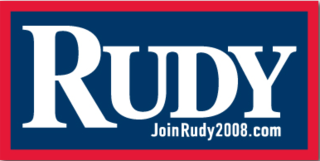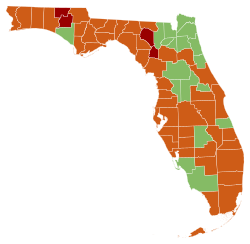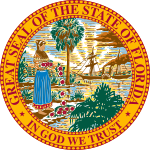
The 2008 United States presidential election was the 56th quadrennial presidential election, held on November 4, 2008. The Democratic ticket of Barack Obama, the junior senator from Illinois, and Joe Biden, the senior senator from Delaware, defeated the Republican ticket of John McCain, the senior senator from Arizona, and Sarah Palin, the governor of Alaska. Obama became the first African American to be elected to the presidency, as well as being only the third sitting United States senator elected president, joining Warren G. Harding and John F. Kennedy. Meanwhile, this was only the second successful all-senator ticket since the 1960 election and is the only election where both major party nominees were sitting senators. This was the first election since 1952 in which neither the incumbent president nor vice president was on the ballot, as well as the first election since 1928 in which neither ran for the nomination.
The following is a timeline of major events leading up to and immediately following the United States presidential election of 2008. The election was the 56th quadrennial United States presidential election. It was held on November 4, 2008, but its significant events and background date back to about 2002. The Democratic Party nominee, Senator Barack Obama of Illinois, defeated the Republican Party's nominee, Senator John McCain of Arizona.

The 2008 Iowa Republican presidential caucuses took place on January 3, 2008. The Iowa Republican caucuses are an unofficial primary, with the delegates to the state convention selected proportionally via a straw poll. The Iowa caucuses mark the traditional formal start of the delegate selection process for the 2008 United States presidential election.

From January 3 to June 3, 2008, voters of the Republican Party chose their nominee for president in the 2008 United States presidential election. Senator John McCain of Arizona was selected as the nominee through a series of primary elections and caucuses culminating in the 2008 Republican National Convention held from Monday, September 1, through Thursday, September 4, 2008, in Saint Paul, Minnesota. President George W. Bush was ineligible to be elected to a third term due to the term limits established by the 22nd Amendment.

The Mitt Romney presidential campaign of 2008 began on January 3, 2007, two days before Mitt Romney left office as governor of Massachusetts, when he filed to form an exploratory committee with the Federal Election Commission to run for President of the United States as a Republican in the 2008 election. Subsequently, on February 13, 2007, he formally announced his candidacy for the Republican nomination for president in 2008. He did so at the Henry Ford Museum and Greenfield Village in Dearborn, Michigan, as an emblem of American ingenuity.
Statewide public opinion polls conducted relating to the 2008 Republican Party presidential primaries, typically using standard statistical methodology, include:

The 2008 presidential campaign of Rudy Giuliani began following the formation of the Draft Giuliani movement in October 2005. The next year, Giuliani opened an exploratory committee and formally announced in February 2007 that he was actively seeking the presidential nomination of the Republican Party.

The 2008 presidential campaign of John McCain, the longtime senior U.S. Senator from Arizona, was launched with an informal announcement on February 28, 2007, during a live taping of the Late Show with David Letterman, and formally launched at an event on April 25, 2007. His second candidacy for the Presidency of the United States, he had previously run for his party's nomination in the 2000 primaries and was considered as a potential running mate for his party's nominee, then-Governor George W. Bush of Texas. After winning a majority of delegates in the Republican primaries of 2008, on August 29, leading up to the convention, McCain selected Governor Sarah Palin of Alaska as his running mate for Vice President. Five days later, at the 2008 Republican National Convention, McCain was formally selected as the Republican Party presidential nominee in the 2008 presidential election.
The first political debate before the 2008 Republican primaries was held on May 3, 2007, at the Ronald Reagan Presidential Library in California. Other debates have taken place in New Hampshire, South Carolina, and Florida. They were generally broadcast by television networks.

The Mike Huckabee 2008 presidential campaign began on January 28, 2007, when former Governor of Arkansas Mike Huckabee announced his candidacy for the Republican nomination for President of the United States for the 2008 election. Huckabee ultimately ended his bid for the nomination after losing the Texas Republican primary on March 4, 2008.

The 2008 United States presidential election in Iowa took place on November 4, 2008, as part of the 2008 United States presidential election. Voters chose seven representatives, or electors to the Electoral College, who voted for president and vice president.

The 2008 New Hampshire Republican presidential primary took place on January 8, 2008, with 12 national delegates being allocated proportionally to the popular vote.

The 2008 Michigan Republican presidential primary took place on January 15, 2008. Mitt Romney came in first with 39 percent of the vote, followed by John McCain with 30 percent and Mike Huckabee in third-place with 16 percent. The victory was widely viewed as critical for the Romney campaign, as a loss in Michigan, where his father was governor, would have resulted in a loss of momentum after two losses already in New Hampshire and Iowa.

The 2008 Nevada Republican presidential caucuses was held on January 19, the same day as the 2008 South Carolina Republican primary, with 31 delegates at stake. Mitt Romney was the winner in Nevada with 51% of the votes, with Ron Paul in second place. Half of Romney's votes came from Mormons, while two-thirds of the independent voters favored Paul. According to the Las Vegas Sun, Republicans crossed over in large numbers to vote Democratic; CNN exit polls indicated that Republican voters made up 4% of the Democratic caucus turnout.

The 2008 Oklahoma Republican presidential primary was held on February 5, with 41 delegates at stake. It was a closed primary, meaning only registered Republicans could vote in the election. The primary was on Super Tuesday on the same day as twenty-three other states. John McCain won Oklahoma's primary with 37% of the vote, although Mike Huckabee picked up some delegate votes as well by receiving 33% of the vote.

The 2008 Delaware Republican presidential primary was held on February 5. A total of 18 delegates were selected. The Delaware Republican Party rallied behind John McCain, and was the declared winner of the primary election after successfully taking all three Delaware counties. McCain was followed by Mitt Romney in second and then by Mike Huckabee in third.

The 2012 United States presidential election was the 57th quadrennial presidential election, held on Tuesday, November 6, 2012. Incumbent Democratic President Barack Obama and his running mate, incumbent Vice President Joe Biden, were re-elected to a second term. They defeated the Republican ticket of former Governor Mitt Romney of Massachusetts and Representative Paul Ryan of Wisconsin.
The following is a timeline of major events leading up to the United States presidential election of 2012. The election was the 57th quadrennial United States presidential election held on November 6, 2012.

This article contains lists of notable candidates for the United States Republican Party's 2012 presidential nomination.



















